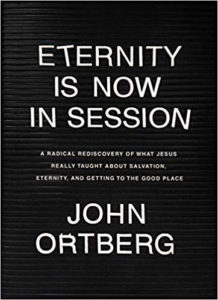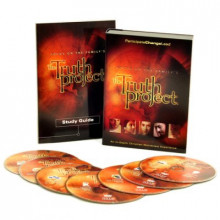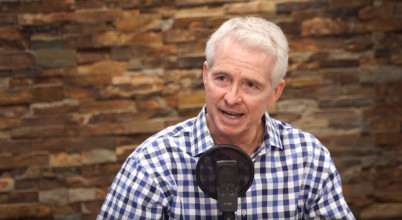Opening:
John Fuller: Last time on Focus on the Family, Pastor John Ortberg explained the difference between making a transaction to get into heaven…and living an abundant life in Christ.”
Excerpt:
John Ortberg: “…And a lot of times, we’ve turned it from “Now, to trust Christ, I’m ready to obey Him in everything, to “Well, If I trust Him, I don’t have to obey Him in anything, because I’ve got the arrangement for getting into heaven taken care of, and we actually misunderstand what it is that He was saying and the power that He has to make life different.”
End of Excerpt
John F.: And we are going to continue this fascinating conversion with Pastor Ortberg today. Your host is Focus President Jim Daly, and I’m John Fuller.
Jim Daly: John, last time it was really good to dive into this topic in a deep way, when we were together last as we discussed the concept of beginning eternity TODAY, it’s not something way out in the future after we die, eternity starts for the believer the moment they say they believe in Christ.
Jim: Pastor John Ortberg is the senior pastor at Menlo Church in the Bay area, he is one of my favorite guests here at Focus on the Family. John, welcome back.
John O.: This is one of my favorite places to be. Thank you for having me back.
Body:
Jim: One of the things I appreciate about what you’ve written in Eternity is Now in Session is this reminder that salvation isn’t kind of a destiny. I mean, it’s the now. It’s here. And in that context, when I think of sanctification, the church in America – again, at least North America, I think – we’re pretty good about getting you to make that decision.
And then we kind of hang up the hat and say, “OK, that person’s in.” But there’s a lifetime now of what we refer to as sanctification, that – that journey… to become more like Christ in our marriage, in our parenting, maybe in our grand parenting – whatever it might be. We’re not that good at that part with one another. I mean, we – we’re kind of left out in the pond by ourselves, you know? We’ve been given the fish now, and what do we do? Does that make sense?
John O.: This will sound really odd, probably, to a lot of people, because in our day, if you ask most folks in church, “Are you a Christian?,” they’re able to answer that question. If you ask them, “Are you a disciple?,” that feels kind of fuzzy.
Jim: We don’t even know – OK, what’s your definition…
John O.: Yeah.
Jim: …of a disciple?
John O.: Yeah. A disciple is someone whose ultimate goal is to learn from Jesus how to live like Jesus, how to live the way that Jesus would live if he was in my place. That’s a disciple, and the non-disciple is somebody whose ultimate goal is anything else.
Jim: Hm.
John O.: And, in the New Testament, the word “Christian” is only used three times. The Bible has almost nothing to say about – Jesus never used the word Christian, never asked anybody to become a Christian, never told the church to go out and make Christians. The word “disciple” is used 269 times, and a disciple is somebody who has said, “I’ve become a follower of Jesus.” The problem, I think, in our day is our general definition of Christian is – a Christian is somebody who has satisfied the minimal entrance requirements for getting into heaven when they die.
Jim: Yeah.
John O.: And we usually think of that in terms of professing a few beliefs, and that’s where – in the New Testament, you simply don’t see that category. The – in the New Testament, Jesus comes and says, “Follow me, follow me, follow me,” and then people do. Now, of course, with such a person, God is going to forgive their sins by grace. Of course, with such a person, God is not going to allow death to stop their fellowship with him. But that relationship is about much more than just getting the heaven job done. It is about life right here, right now. And if you understand the offer that Jesus made, the only logical response to that is to become a disciple because discipleship is how I absorb – how I make my way into the life that Jesus offered.
Jim: Yeah. You used, I think, a great illustration when we talk about this idea of, you know, the destination in salvation with Helen Keller. Now, not everybody may remember Helen Keller. She was deaf, and she could not speak…
John O.: Yeah.
Jim: And yet, somebody took a great interest in her.
John O.: It’s a very powerful story – yeah – that just gets repeated over and over. And – and yes, she was – in many ways, this is such a picture of our captivity to sin and darkness. She was captive in her case by being closed off from the world of words and relationships and love. And then there was a teacher that came into her life, Anne Sullivan, and very patiently, as an act of grace, came alongside of her. It’s an amazing story, and it was water. It was her sensation of water, and then her teacher spelling out onto her hand the letters that meant water. And for the first time, Helen Keller understood the word and that this is water, and a new world opened up to her. And a world – it was a world of relationship and a world of meaning. And the word came through the word. And so, then her natural response, of course, was to become a student of her teacher, not to earn her teacher’s favor, or to get put into some kind of a legal category, but because if you want to enter into and grow in the best world, which is a world of words and meaning and love, the way you do that is to become a student. And I don’t know why we have lost the centrality of becoming a student, an apprentice, a learner, a disciple of Jesus, not as works righteousness, not as a way of trying to earn spiritual brownie points, but that’s the way that we grow into life, which alone is worth having.
Jim: (Laughter) That is so good. But I love that. She just poured that water…
John O.: Yeah.
Jim: …Over her hands.
John O.: Yeah.
Jim: And all of a sudden, a whole new world opened up to her.
John O.: And it came to Helen from the outside. She didn’t merit it. It wasn’t her own cleverness. It came to her as a gift from another world. And salvation is that way. And it can come on somebody right now. There could be somebody listening to us right now, and you feel your heart pounding a little bit. And that is the offer, the gift of life, salvation coming to you from outside yourself.
Jim: Yeah.
Jim: You know, John, one of the common statements I’ll hear from someone who is spiritually-minded, but can’t quite get there with the Christian faith – they’ll say something to me like, “You know, I had a guy who claimed to be a Christian, and he didn’t pay me the $10,000 he owed me. And so, I just cannot believe what that person believes.” And my response now is to say something like this. “You’re stupid.” I mean, and it gets their attention, which is what I’m trying to do, which is to say, first of all, your eternal soul’s worth 10 grand. I mean, you’re putting a price tag on it.
John O.: Yeah.
Jim: And secondly, you’re letting a human being who – by the way, human beings will disappoint, right?
John O.: Mmm hmm.
Jim: Human beings disappointed God.
John O.: Yeah.
Jim: And human beings are going to disappoint us. And to hang that much on somebody’s label of Christianity but not living it, everything that we’ve talked about – you know, they’ve got maybe the superficial consumer version of Christianity going, but they haven’t lived it. They haven’t sacrificed – in that case, to pay the money that they owed to maintain the testimony of what they say. And think of that millstone that that person has around their neck. But, I’m trying to jar that person back to re-look at it, because this is between you and God, not the guy that stiffed you.
John O.: Yeah. You know, one of the biggest complaints that people have about Christianity is hypocrisy. That’s huge up on the list. There’s a couple of years ago by, uh, Dave Kinnaman and Gabe Lyons, about – UnChristian. And that was one of the primary complaints. One of the ironies of that is that the – the primary originator of the problem of hypocrisy in human life is Jesus.
Jim: (Laughter).
John O.: The word hypocrisy is used – I think it’s, like, 13 times in the Bible. It’s from a Greek word, hupokrites, that was used for actors that would carry a mask.
Jim: Right.
John O.: And Jesus is the only one to use that word in the New Testament. In fact, there’s an article that says, most likely, Jesus is the one who coined that…
Jim: Hm.
John O.: …To describe the problem of religious hypocrisy. In fact, when Jesus was growing up in Nazareth – this is more than you wanted to know.
Jim: No, this is good.
John O.: There was an ancient town called Sepphoris that was being constructed, and it had a major theater, and it was just a couple miles away from Nazareth. Jesus, his father was a construction guy. It’s very possible that Jesus helped to construct Sepphoris, possibly even that theater – possibly saw that, which is part of why he coined that term. So anytime somebody talks about the problem of hypocrisy amongst religious people, they’re really echoing the words of Jesus above all else. And you might remember – if people want to look, there’s a passage – especially Matthew 23 where he’s just thundering about folks who claim to believe in God and claim that they tithe on tiny little, you know, elements of their income. But they don’t care about justice. They clean up the outside of the cup, but they don’t clean up the inside. So anytime somebody cites the problem of hypocrisy among religious folks, they’re actually quoting Jesus more than anybody else.
Jim: Yeah. And let me say it this way for the person who’s using that…
John O.: Yes.
Jim: …As the reason…
John O.: Yeah.
Jim: …To not move forward…
John O.: Yeah.
Jim: …To answer that truth claim of Jesus…
John O.: Yeah.
Jim: …To just rest there and say, eh, bunch of hypocrites…
John O.: Yeah.
Jim: …What would you say to that person?
John O.: I would say, “If you do that consistently, you cut yourself off from every value any human being has ever known,” because people who claim to be devoted to any profession or Republican or Democrat or, uh, work with a relief agency – there is no value, ideology, political party that has not attracted massive amounts of hypocrites. And in fact, often – I mean, the whole point of being a hypocrite is you want to attach yourself to something – to something that looks good. So, the better the cause, the more likely it is to attract hypocrites. But if I say, “Any cause that has attracted hypocrites to it, I will separate myself from,” I will never be a part of anything worthwhile or noble. So, I think the idea that anybody would say, “My strategy for life is I will refuse to be a part of something that has any hypocrites” – you’re cutting yourself off from any possibility of a worthwhile life, and that is stupid.
Jim: John, we’ve seen lately – and I’m sure we’re going to see again – notable Christian leaders who are reevaluating their commitment to Christ and some as bold to say that, “Now that I’ve tried to live it, I’ve fallen short. I don’t think anybody truly can live it. I don’t even know if it’s real.” And they let everybody know on social media that that’s their position. And, of course, the world gravitates toward that, so it gets a lot of velocity in social media because they say, “Aha, see? We were right. Faith is wrong. And here’s and here’s Exhibit A.”
John O.: Hmm.
Jim: First of all, just at a high level, when that happens, what do you think is going on, and how should we, as faithful believers in Christ, respond to this?
John O.: Yeah. Um, part of what it reminds us of is, nobody knows what’s happening deep in the soul of any other human being.
Jim: That’s so right.
John O.: Somebody was telling – I was talking to somebody this morning. They were saying, “Everybody has a mountain to climb that only they know about…”
Jim: Hmm.
John O.: And we look at the outside. I think, for anybody who’s listening to us, don’t be surprised if it rattles you a bit. I remember a very prominent teacher when I was very young going through school, and it’s a person that eventually left the faith. And it did kind of shook me ’cause I felt like, well, part of the reason I was confident in my faith is, I thought, “This is really smart guy.” And – and he agreed with it. And so if he’s left it, I’ve lost a little support in that sense.
Jim: Huh.
John O.: So, I wouldn’t be surprised if you find yourself a bit shaken. But then – then the question is, “What do I do with that? How do I use that?” And I would say, use that by going back to look at God and your faith itself. I think a major problem in our day is we live in a massively celebrity culture.
Jim: Mmm hmm.
John O.: And we attribute to celebrities godlike status.
Jim: Mmm hmm.
John O.: And so, we’ll get advice on how to manage relationships from some reality star who’s (laughter) been a train wreck in, you know…
Jim: Exactly, right (laughter).
John O.: …Ten marriages. It’s like, really, seriously?
Jim: (Laughter).
John O.: That’s – that’s how I’m going to find out, you know, how to find a parent – parenting advice or achieve emotional health? So I think it’s a really good opportunity to say, “I need to examine my own participation in a celebrity-worshipping culture.”
Jim: Yeah.
John O.: …Uh, and, uh, uh – refuse to participate in that, and actually go back to a courageous, difficult question, which is, “What do I really, honestly believe, and why do I believe it?” And Jim, I find often in churches, people feel such a pressure that they’re supposed to believe, that they’re often afraid to ask that question, “What do I really believe?”
Jim: Yeah.
John O.: Uh…
Jim: It’s like it’s not allowed, or you feel it’s not allowed.
John O.: Or – or there’s a fear. They’re afraid, underneath it, I’m going to find out that I don’t really believe, and then I’ll be in big trouble. A very important thing to understand about belief is, you cannot manufacture it by willpower. You can’t make yourself believe something. There’s that old line in Alice in Wonderland where the queen asks Alice, “Do you believe in impossible things?” And Alice says no. And the Queen’s – “I believe six impossible things before breakfast.”
Jim: (Laughter).
John O.: You can’t make yourself believe something. But to be deeply honest about what you really believe is actually the first step towards building a strong faith.
Jim: Yeah.
John O.: And I think part of what we need to do in churches is make churches a real safe place for people to name their doubts. ‘Cause I think the danger is not when people have doubts. We all have doubts. We live in a day when, uh, skepticism is given priority, and so faith is much harder today than it was 500 years ago. Five hundred years ago, it was hard for people not to believe in God. Today – and I see this with young people more and more – when you talk with young people, uh, their struggles with doubt are massive. So the first place, actually, is to begin by making the church a real safe place to talk about doubt and ask, “What is it that I really do believe, and what are my doubts?” and then to make that an issue between me and my life with God. And actually, the best steps to take, if you find yourself struggling with doubt, are not primarily around intellectual questions. Those may be really important. The best step is to ask yourself, “What’s the next right thing to do?” And then do it.
Jim: Mmm hmm.
John F.: Mmm hmm.
John O.: Jesus had a really interesting statement. He said, if you – this is in John. “If you do my will, you will know it is from my father.” If you do my will – so you make your life a great experiment and actually do the will of Jesus, and you will find – I believe this deeply – it is self-validating.
Jim: Yes.
John O.: The will of God is self-validating. And I find when I pursue love, and when I pursue joy, and when I pursue generosity and when I ask for God’s help, I learn in the marrow of my being it is real, and it is true. And that is a faith that does not fluctuate when whatever celebrity or famous person goes to the right or to the left.
Jim: Yes.
John F.: John, you’re saying something that grabs my attention because for a long time, I’ve – I’ve been concerned about the lack of biblical interaction.
John O.: Yeah.
John F.: And by that, I mean us being disciples of Jesus reading his words, reading the Scripture, and really knowing it and spending time with it. And there – there is a gap it seems, a growing gap, between people who say they’re of faith…
John O.: Yeah.
John F.: …But they ignore the text. So how do we ground ourselves so that when somebody says, “I no longer believe that,” it doesn’t cause us to panic, but we go back to the truth of the Scripture, that we know. How do we do that?
John O.: Yeah. Um, this, I do believe, just requires a real firm intention on people’s parts. For a bunch of reasons, we live in a world where simply being immersed in the text of the Scriptures is harder and harder. You know, our attention spans get shorter. We got more stuff to read. I was reading about Lincoln a while ago. Lincoln had the – almost the whole Bible almost memorized. Part of it is ’cause he had nothing else to read.
Jim: Right.
John O.: He had Aesop’s Fables, just a couple of things. So, people used to be immersed in it ’cause they just did not much else. Now we have so much else. So, uh, it does take time for people to say, uh, not in a legalistic way, but out of my own hunger for God, I will take large chunks of time. Uh, and I think, in the mornings, to have a little time to orient yourself spiritually is a good thing. I don’t think being legalistic about a quiet time is the primary solution to life. But outside of that, to have chunks where you have an hour or two hours or a day just to read through the Gospels is irreplaceable. And then to actually seek to do what they say, so that they can start to shape the thoughts that are going on in my mind. And I do believe it is the case that there is just no replacement for a mind that is immersed in the Scriptures and, in particular, into life and teachings of Jesus.
Jim: And in that regard – and this is a good place to wrap up. We couldn’t cover – man, I’d just love to keep talking, because I – this is an area that just interests me. My heart seems to come alive, because it’s life-giving. And I’m so grateful that you’ve written this. These are tough subjects, especially, if I could say it, for myself, for lazy Christians.
John O.: (Laughter) Yes.
Jim: I mean…
John O.: Which we all are, Jim.
Jim: Man.
John O.: Yeah.
Jim: We’re comfort and leisure all the time.
John O.: Yeah. Yeah.
Jim: I’ll spend four hours playing golf, but when was last time I spent four hours diving into this?
John O.: Yeah.
Jim: Right?
John O.: Yeah. Yeah.
Jim: And, we need to be excited about the things that excites the Lord’s heart, in my opinion. Now, I don’t want all the golfers to be upset with me. But here’s that last question. You’ve written a lot about abiding in Christ. And you reference the Gospel of John in that regard where he talks about abiding in the vine and bearing fruit. You know, some – it’s funny. As a sidebar here, so many new believers or people who are just about to make that decision – I’ll talk to them. They don’t get all the analogies, the poetry of Scripture.
John O.: Yes.
Jim: “What’s this about us being a vine? And who’s the fruit?”
John O.: (Laughter).
Jim: And, you know, eventually, like Helen Keller, that falls into place for them. Their eyes are opened. But in that regard, what do you mean by all that, you know, that we can abide in Christ like the vine?
John O.: Yeah. So, to get real concrete with it, a vine abides – you know, physically, it will be rooted in something. For anybody listening to us, we do that mostly with our mind. Our minds are always abiding in something. I liked baseball. I was looking – I’ll follow how Mike Trout does. I don’t know why. For some reason, I just love Mike Trout.
Jim: The big hitter for the Angels.
John O.: And he’s just this massively successful – uh, yeah, hitter for the Los Angeles Angels. And when his batting average goes up, I delight in it.
(LAUGHTER)
Jim: That’s like hitting a birdie.
(LAUGHTER)
John F.: Yeah. You would love to…
Jim: (Laughter).
John O.: Exactly. You know, people’s minds – well, if you hit a birdie, you will picture that over and over in your mind. Our minds can be rooted in anger or bitterness. And the invitation – the great invitation of the Scriptures and supremely of Jesus is to have our minds abiding, rooted in the fact that there is a God who is unspeakably good and powerful. And he is joyful. He is radiantly happy. And he is happy in you. And he is watching over you all the time. And he wants to give you whatever you need. He wants to inspire your thoughts, decisions and intuitions. He wants to help you relax. He wants to be with you from one moment to the next. You have absolutely nothing to worry about. Whatever is going on in your financial life with your health – for your mind to be rooted in that – God loves me. God cares for me, and therefore I can delight in this moment. I can delight – nature, creation is one of the main ways. So, actually, golf is a great way of abiding with God.
Jim: You can pray along the way. I do that.
John F.: (Laughter).
John O.: You can pray – actually, one of the great prayers – because I’ll golf, too, and I’m not good at it. It’s a great place to pray, “Thy will be done.”
Jim: (Laughter) That’s for sure.
John O.: And I kid you not, I can get so frustrated and so angry. And then that prayer of release – “God, your will be done.” I can’t control what happens with this shot. And it will sound really weird. And then, “God, how do I bless this person that I’m with? And how do I learn as I look around at the beauty of the green that you’re right here?” So, there is no place, even a golf course, where the possibility of abiding in God is not available to me. Mostly, it happens through my mind. And every time you just turn your thoughts God-ward, that little root is going in him.
Jim: John, again, so good – I want to cover one last story you had about a para-glide.
John O.: Oh, yeah.
Jim: …That I think captures it. But before that, let me turn to the audience. Man, this is great content. And I hope you are encouraged. If you’re in that kind of consumer Christian mode, where you’ve covered the bases, but it’s not integrated into your life, you’re not waking up every day saying, “Lord, what can we do today? Help my heart to be open to you today” – regardless of your vocation, I don’t think the Lord really cares what you’re doing as long as you’re waking up for him every day saying, “Let’s do something together.” And if you wanna grow deeper in your relationship with Christ, this is a resource for you – Eternity is Now in Session. Start building forward and living a life that God is working through to build His kingdom.
John F.: And you can get a copy of that book and other helpful resources at might – other helpful resources to grow in your spiritual faith, at focusonthefamily.com/broadcast. Or if you’d like, give us a call, and we’ll talk some of this through with you. Our number is 800, the letter A and the word family.
Jim: All right, John. Now, first of all, paragliding is dangerous. OK. With that disclaimer out of the way, how did God use that as an illustration?
John O.: Yeah, a friend of mine talked me into it, so I did it one time. And…
Jim: (Laughter).
John O.: It helped me to think about belief. You were talking earlier about faith and works. And people will sometimes wonder, “Is there a tension between faith and works?” At the deepest level, my works, my behavior, my action, simply reveals what I really believe. The most important kind of belief, the kind of faith that Jesus wants to change is this – you have a mental map about how things are, and you live at the mercy of that mental map. So, I believe in gravity. I don’t have to say, “Today, I’m gonna really, really demonstrate my commitment to…” I just believe that’s how things are. So, I never violate that belief. When I was going parasailing with my friend – paragliding, where you jump off a cliff…
Jim: (Laughter) OK. What?
John O.: They explained to us, you know, here’s how the – here’s how the equipment works. Here’s the carabiners. Here’s the harness. It’s all safe. And when we were at a safe place, and they were talking that through, I thought I believed it all. When I got to the edge of the cliff where I’m about to jump off, I found out there are parts of my body that don’t believe this is safe at all.
Jim: Right.
John O.: My armpits don’t believe this. My palms don’t believe this. And, so then I had to choose to go ahead and jump, but it was difficult, because I pictured my body, you know, lying dead on the ground, my children orphaned, my wife married to another, more attractive man. And uh…
Jim: (Laughter) All those bad things.
John O.: Yeah. Yeah. So, then I had to choose. Do I jump or not? Now, for people that do that on a regular basis, they come to believe with their whole body what they say they believe in their mind. Eventually, you keep doing it enough, and the palms of your hands believe, and your armpits believe. One of the ways to think about spiritual growth is to come to believe with my whole body what I say I believe in my mind. And depending on my circumstances, when I’m standing on the edge of the cliff, I may not have nearly as much certainty as I did when I was in a different situation – as just revealing to me what’s going on in my mind. The invitation of Jesus is actually for us – there’s another wonderful topic to get into some time – for us not just to have faith in Jesus – that he knows what he’s talking about – but to come to have the faith of Jesus – that his mental map about how things are becomes my mental map about how things are. So, I – I trust in the care of God as naturally as I trust in gravity.
Jim: Wow.
John O.: Now, of course, I don’t do that yet. But that’s…
Jim: No, but that’s the goal.
John O.: That’s the goal. And that’s the point – when you begin to do that, that’s when – for a mature person, that’s, again, part of the joy that we often don’t get. It’s not somebody who goes around with teeth gritted, working really hard to be obedient. Eventually, for Jesus, it was not hard to be obedient. It just flowed naturally out of the way he saw things.
Jim: Yeah.
John O.: Just like it’s not hard for me to be obedient to gravity, this is – this is natural. Well, if I ever have faith in God like I have it in gravity, then obedience will be that same way. And because that’s reality, that’s the only way to live.
Jim: So good. If you’re there living in a spot where your faith is, in some doubt, get a hold of us. We’ll put this resource into your hands. If you can help us financially, great. If you can’t, fine. Get a hold of us. We’ll get it into your hands because we believe in the content that much – believe in the content that much. John, thanks for being with us.
John O.: It was just a joy. Thanks for having me.
Closing:
John F.: And I might add that in addition to John’s book, we have a little booklet that you can download on our website. It’s called Coming Home: An Invitation to Join God’s Family. And it’s gonna explain very simply what it means to start that walk with Jesus, as John has described here. Get that and his book at focusonthefamily.com/broadcast or call us. Our number is 800, the letter A and the word FAMILY.
Coming up next time practical advice for husbands and wives who want to have a great marriage.




















